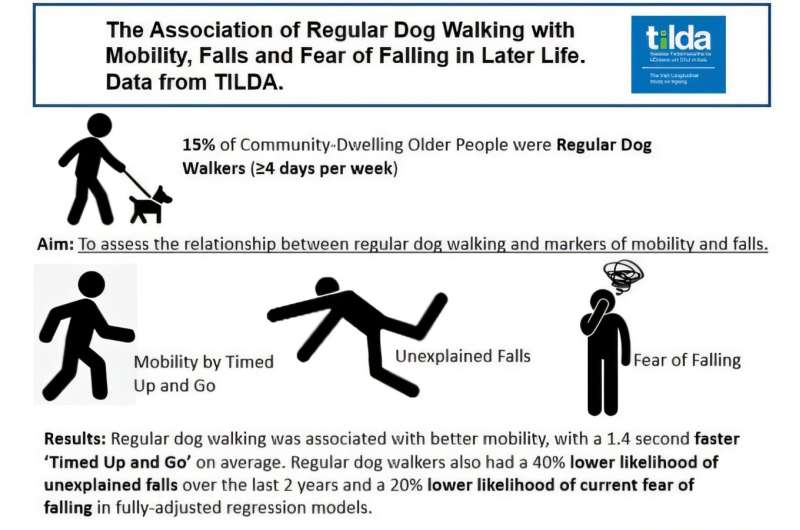This article has been reviewed according to Science X's editorial process and policies. Editors have highlighted the following attributes while ensuring the content's credibility:
fact-checked
peer-reviewed publication
trusted source
proofread
Regular dog walking found to improve mobility and reduce falls in older adults

New research from The Irish Longitudinal Study on Ageing (TILDA) at Trinity College Dublin has revealed the significant benefits of regular dog walking for older adults. The study is published in the Journals of Gerontology.
Up to now, little research has looked at the suggestion that dog walking may protect against falls and mobility problems later in life. This study assessed if regular dog walking was associated with reduced likelihood of falls, fear of falling and mobility problems in a large cohort of community-dwelling older people.
Falls are the most frequent reason older people are admitted to hospital and the most common cause of accidental death in later life. Falls are strongly associated with fractures, including hip fractures, subsequent loss of independence, increased health care use, admission to nursing homes and earlier mortality.
TILDA data shows that around 30% of people in Ireland aged 70+ fall annually, and 1 in 8 present to an emergency department with a fall each year. With increased longevity, the number of older people presenting with falls will increase considerably over coming decades. It is imperative then that we identify strategies that reduce the risk of falls and can be employed at a population-level.
Study methods include:
- Participants ≥60 years at Wave 5 of The Irish Longitudinal Study on Ageing were included. Regular dog walking was ≥4 days/week by self-report.
- The control group consisted of participants who did not own a dog or dog-owners who did not walk their dog regularly.
- Falls and fear of falling were by self-report. Mobility was measured with Timed-Up-and-Go (TUG).
- Logistic Regression models assessed associations between regular dog walking and outcomes of interest.
- The study analyzed data from over 4,100 participants aged 60 and older, utilizing TILDA Wave 5 data.
Key findings include:
- Improved Mobility: Regular dog walkers completed the Timed-Up-and-Go (TUG) test significantly faster than non-dog walkers (10.3 seconds vs. 11.7 seconds on average). The TUG is a sensitive and specific measure of probability for falls among older adults
- Reduced Falls: Regular dog walkers were 40% less likely to experience unexplained falls.
- Lower Fear of Falling: Participants who walked their dogs regularly were 20% less likely to report fear of falling, a known factor in mobility avoidance and diminished quality of life.

The study emphasizes the potential role of dog walking in promoting physical activity and social interaction, both of which are critical for maintaining independence in later life. Importantly, while physical activity levels between dog walkers and non-walkers were broadly similar, the specific activity of walking a dog appears to confer unique benefits.
The study also highlights the importance of promoting activities that are both enjoyable and health-enhancing as we age.
Professor Robert Briggs, Consultant Geriatrician, St James's Hospital and Trinity College, and co-author, said, "This study demonstrates the potential benefits that regular dog walking can confer on older people. Regular dog walkers had significantly better mobility, reduced likelihood of falls and were less likely to develop fear of falling.
"While this may be partly due to increased physical activity, it is also likely that increased social interaction, companionship and purpose derived from having a dog also plays an important role. We see how important pets are in the lives of older people we encounter both in St James's Hospital and the TILDA study and it is therefore heartening to see the benefits borne out in this study."
Lead author Dr. Eleanor Gallagher, Specialist Registrar in Geriatric Medicine (formally Trinity College Dublin, now Letterkenny Hospital), said, "Our findings highlight the value of regular dog walking as a simple and accessible activity that not only improves physical health but also has benefits for mental well-being and confidence among older adults."
More information: Eleanor Gallagher et al, The Association of Regular Dog Walking with Mobility, Falls and Fear of Falling in Later Life, The Journals of Gerontology, Series A: Biological Sciences and Medical Sciences (2025). DOI: 10.1093/gerona/glaf010





















